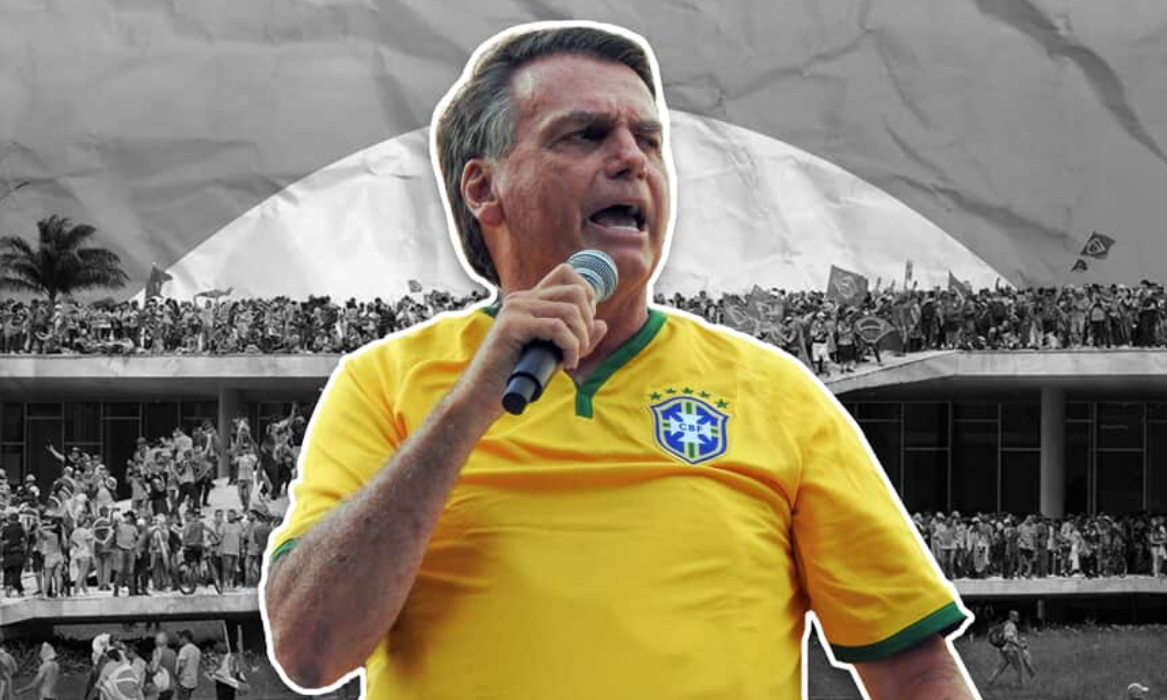Photo credit: Arte Migalhas
Written By: Clara Matiello
Brazil’s Attorney General Paulo Gonet indicted former president Jair Bolsonaro and 33 others– 24 of whom were members of the military– on February 19th. This came after three months of political tension in Brazil. In a 272 page report sent to the Brazil Supreme Court, Bolsonaro and others were charged with armed criminal organization, coup d’état, attempted abolition of the democratic rule of law, damage qualified by violence, serious threat against federal property, and deterioration of listed property.
The current government argues the indictment stems from the protests and riots that took place on January 8th, 2023. Luiz Inacio Lula Da Silva– Brazil’s current president– won the election upon his release from federal prison where he was serving sentences for corruption and money laundering from his previous presidential term. Similarly to January 6th, 2021 in the United States, thousands of Bolsonaro supporters broke-in and entered Brazil’s Capitol on January 8th, 2023. They vandalized the Brazilian Congress, Supreme Court, and Palácio do Planalto (the Brazilian ‘White House”). The rioters were protesting the results of the presidential election.
Now, more than 2 years later, the Attorney General’s Office is still seeking prosecution for what the administration refers to as “vandalization of symbols of democracy.” In the aftermath of January 8th, at least 1430 of those involved in violent acts were criminally prosecuted, including 7 senior military police officers. Most of the protestors demanded a military intervention to bring former President Bolsonaro back to power and remove President Lula from office since they claimed there had been widespread election fraud. Prosecutors alleged that those senior military officers were aware of the intentions of the protestors to violate institutions and spread misinformation about the legitimacy of the presidential election.
Many in the military sided with former President Bolsonaro’s claims of election fraud. His popularity with ranking officers within Brazil’s military is due to his enrollment in the army for 15 years, eventually reaching the rank of Captain. He also appointed many military officers to administrative positions during his term and passed legislation expanding military resources and budget.
Attorney-General Paulo Gonet wrote the 272 page report denouncing Bolsonaro. He suggested that Jair Bolsonaro and his running mate, Walter Braga Netto, actively led the group of intruders. The report splits the charges in 5 categories: armed criminal organization, attempt to abolish the democratic rule of law by violent means, Coup d’État, qualified damage by violence, serious threat against Union Property with Considerable Harm to the Victim, and Deterioration of Listed Heritage Property.
Within the report, which has not yet been released to the public, sources say there is evidence indicating that the ultimate goal of the attack was to assassinate President Lula, Vice President Geraldo Alckmin, and Supreme Court Justice Alexandre de Moraes who— along with 4 other judges— has been tasked with deciding whether or not the court should move forward with the charges. This adjudicating panel conducted hearings on March 25th.
Bolsonaro has defended himself against the charges, stating he “doesn’t give a sh*t about prison” while also accusing the current government of fabricating internal enemies in order to stay in power. Bolsonaro has almost 600 legal cases pending in court and he is the fourth Brazilian president to be prosecuted. However, this is the first time a Brazilian president was publicly denounced by the sitting government for attempting to overthrow democracy. With the country at a crossroads, the Supreme Court’s decision could either bring resolution or set the stage for further instability as Brazil grapples with its most consequential political crisis in decades.
As of March 2025, a significant group of Brazilians are still showing support for Bolsonaro; a rally took place on March 16th in Rio De Janeiro where 18,000 people gathered at Copacabana Beach in light of the approaching adjudicating panel. Additionally, Bolsonaro’s son, Eduardo Bolsonaro, flew to the United States this month seeking political asylum for him and his family. He claimed the current Brazilian government, specifically Alexandre de Moraes, has been persecuting the Brazilian far-right. As of now, it is still uncertain when a trial would take place if there is one. The precedent this process will set in Brazilian politics, democracy, and rule of law could significantly influence the balance of power and the trust in public institutions.
